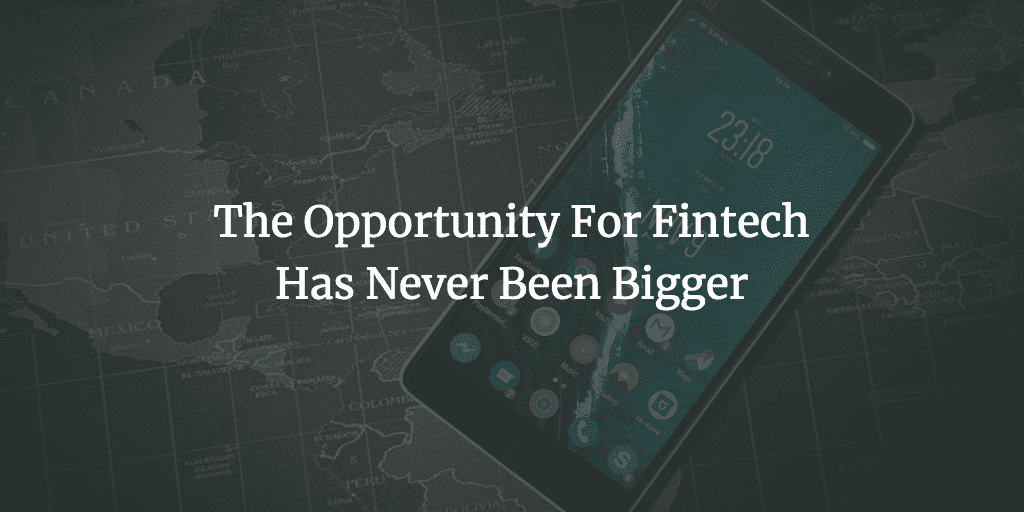[Editor’s note: This is a guest post from Douglas Lopes, the Chief Financial Officer of Airfox, a venture-backed fintech company based in Boston and São Paulo. Airfox is on a mission to accelerate financial inclusion for the underbanked within emerging economies. Airfox aims to create an entirely new financial services model for the underbanked that democratizes access to capital and financial services with a mobile-first solution.]
To produce the EY Global FinTech Adoption Index 2019, EY researchers interviewed more than 27,000 consumers in 27 markets across the globe. They found that the FinTech “adoption rate is growing faster than anticipated. The actual global adoption rate of 64% in 2019 exceeds by 12 points the 52% future adoption rate” forecast just two years ago.
Fintech contenders frequently employ smartphones, cryptocurrency, and/or digital wallets to compete with traditional financial service delivery methods. A ready combination of technological advancement, shifting consumer habits, and enormous underserved markets — particularly in emerging economies — have fused to create the world’s greatest opportunity for disruption and a robust startup ecosystem.
Enabling technology
Greater global internet access and the widespread adoption of mobile technology couple with novel decentralized computational frameworks to underpin most fintech models (most notably in blockchain-powered projects). This comprehensive digitalization also generates mountains of data, which has, in turn, accelerated algorithmic advancement. New data-fed and rapidly evolving AI and machine learning capabilities are increasingly targeted toward speeding labor-intensive business processes and are particularly powerful in financial services applications.
According to Dresner’s 2019 Data Science and Machine Learning Market Study, Financial Services/Insurance respondents now rank data science, AI, and machine learning as critical to success in their industry at the highest rate amongst all market sectors surveyed.
AI and machine learning technologies can speedily process layer upon layer of vast and varied data while surfacing new patterns, reducing risk, and continuously improving function. As The Financial Brand recently reported, “AI changes the path to industry dominance in financial services. No longer will unfair strategic advantage be automatically granted to the bank or credit union with the most assets.” This presents an enormous fintech opportunity, since “scale of data will be increasingly important, with the ability to create unique, contextual experiences driving value and market share.”
Digital culture
Scale, context, and experience are operative words in fintech. As the world’s first “mobile-first” generation comes of age, consumers increasingly expect simple, free or inexpensive, always-on access to the brands they choose to patronize.
Along with mobile adoption and internet access, application marketplaces have inspired a new digital culture. Since there’s now an “app for everything,” people are more than happy to use smartphones for managing the daily necessities of life, and that includes financial transactions.
According to Business Insider’s recent Evolution of the U.S. Neobank Market Report, 89% of respondents say they use mobile banking channels, and 70% say mobile banking has become the primary way to access their accounts. Such usage patterns illustrate how mainstream mobile solutions have become, and widespread customer receptiveness is a serious driver of fintech growth.=
Untapped markets
While modern customers are now, on the whole, receptive to mobile banking, not all modern customers are able to enjoy its conveniences.
The World Bank’s Global Findex states that “among adults in the richest 60% of households within economies, 74% have an account. But among those in the poorest 40%, only 61% do, leaving a global gap of 13% points.”
About 1 in 5 adults (roughly 1.7 billion people) do not have a bank account. And there are millions more who do have bank accounts, but lack traditional credit histories or income baselines and are thus illegible for modern financial services. These unbanked and underbanked masses represent an enormous untapped market globally.
In emerging economies, potential consumers hungry for microcredit and digital transaction capabilities are often shut out of traditional banking systems, which cautiously focus services on top earners and offset risk with prohibitive interest rates. Though the unbanked and underbanked are unlikely to engage in the types of high yield transactions that produce reliable returns for incumbent institutions, they certainly do engage in the types of everyday transactions required of modern life — paying bills, purchasing necessities, etc. — and they’d prefer to be able to do so conveniently and affordably. Millions upon millions of people conducting millions upon millions of transactions daily constitute a financial sleeping giant awaiting the fintech awakening.
That awakening is the greatest fintech opportunity. As World Bank economists note, “We see that fintech plays a progressively greater role in countries like China, where 50% of account owners use a mobile phone to make a transaction from their account. Compared to 2014, twice as many adults in Brazil and Kenya are paying utility bills digitally.”
The shift has not gone unnoticed. According to McKinsey, global venture capital (VC) fintech investment in 2018 reached nearly $40 billion (compared to $1.8 billion in 2011). Business Insider reported that “investors are seeing the potential of newer, conventionally untapped markets…There are also a number of emerging fintech markets, including Brazil, Israel, and Canada, that are likely to play a big part in the global fintech ecosystem in the future.”
Advancements in enabling technologies, mobile-first consumer preferences, and large underserved populations all significantly contribute to fintech’s meteoric ascent — no other market looks better poised to deliver on its promise.



